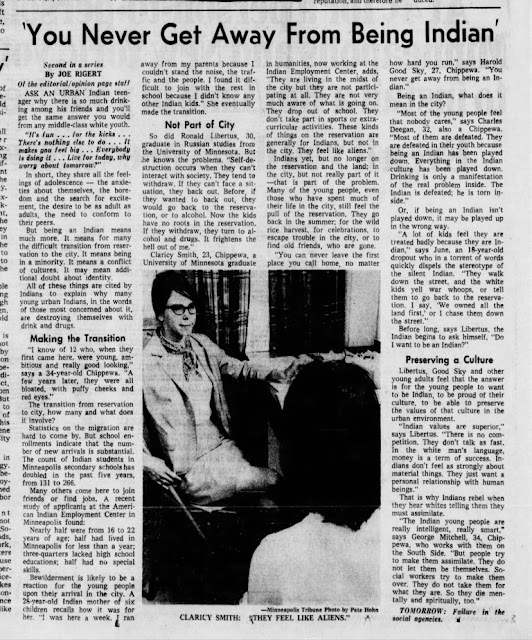1968: “But people try to make them assimilate. Social workers try to make them over. They do not take them for what they are. So they die mentally and spiritually, too.” - George Mitchell, Chippewa
'You Never Get Away From Being Indian'
1968 June 25. Star Tribune
…. Being an Indian, what does it mean in the city?
“Most of the young people feel that nobody cares,” says Charles Deegan, 32, a Chippewa. “Most of them are defeated. They are defeated in their youth because being an Indian has been played down. Everything in the Indian culture has been played down. Drinking is only a manifestation of the real problem inside. The Indian is defeated; he is torn inside.”
Or, if being an Indian isn’t played down, it may be played up in the wrong way.
“A lot of kids feel they are treated badly because they are Indian,” says June, an 18-year-old dropout who in a torrent of words quickly dispels the stereotype of the silent Indian. ”They walk down the street, and the white kids yell war whoops, or tell them to go back to the reservation. I say ‘We owned all the land first,’ or I chase them down the street.”
Before long, says [Robert] Libertus [age 30], the Indian begins to ask himself, “Do I want to be an Indian?”
Preserving a Culture
Libertus, [Harold] Good Sky [age 27, Chippewa] and other young adults feel that the answer is for the young people to want to be Indian, to be proud of their culture, to be able to preserve the values of that culture in the urban environment.
“Indian values are superior,” says Libertus. “There is no competition. They don’t talk as fast. In the white man’s language, money is a term of success. Indians don’t feel as strongly about material things. They just want a personal relationship with human beings.”
That is why Indians rebel when they hear whites telling them they must assimilate.
“The Indian young people are really intelligent, really smart,” says George Mitchell, 34, Chippewa, who works with them on the South Side. “But people try to make them assimilate. Social workers try to make them over. They do not take them for what they are. So they die mentally and spiritually, too.”
 |
| 1968 June 25. Star Tribune |


